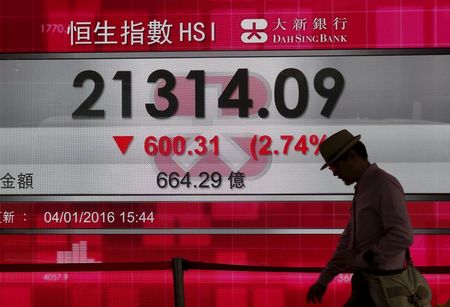Asian stocks fall as yen strength weighs; Hong Kong hit by JD.com losses
2024.08.20 22:45

Investing.com– Asian stocks retreated on Wednesday as strength in the yen spurred a further unwinding in the carry trade, while losses in e-commerce major JD.com dragged down Hong Kong’s Hang Seng index.
Regional markets tracked overnight weakness in Wall Street, as U.S. stocks snapped an eight-day rebound rally amid some caution before an address by Federal Reserve Chair Jerome Powell later this week.
U.S. stock index futures moved little in Asian trade.
Hang Seng falls, JD.com sinks on report of Walmart stake sale
Hong Kong’s index was one of the worst performers in Asia on Wednesday, losing 0.7%.
JD.com (NASDAQ:) (HK:) was the biggest weight on the index, with the stock sinking around 11% after Bloomberg reported that Walmart Inc (NYSE:) was planning to sell its stake in the e-commerce giant for $3.74 billion.
Jd Health International Inc (HK:), which is a unit of the e-commerce firm, fell nearly 4%, while rival Alibaba Group (NYSE:) (HK:) fell 2%.
Wednesday’s losses saw JD largely reverse recent gains made on stronger-than-expected earnings for the June quarter. But the firm faces increased headwinds from slowing demand in China, its biggest market.
The Hang Seng was also headed back towards an over three-month low hit earlier in August. Concerns over slowing growth in China had battered sentiment towards local markets.
China’s and indexes fell about 0.2% on Wednesday, and were in sight of recent six-month lows.
Japan’s Nikkei sinks as yen appreciates
Japan’s and indexes fell 0.8% and 0.7%, respectively, as strength in the yen weighed.
A sharp appreciation in the yen through late-July and early-August- which saw the pair fall as low as 141 yen- largely unwound the yen carry trade.
While the yen had weakened over the past week, it appreciated sharply on Monday, with USDJPY hovering around 145 by Wednesday.
Strength in the yen pressured export-oriented stocks in Japan, which had driven a bulk of the Nikkei’s rally over the past two years.
Jefferies said in a recent note that yen strength presented a weaker earnings outlook for Japanese markets. But the brokerage said persistent strength in the yen presented an overweight stance on Japanese markets, especially those with exposure to domestic demand.
Data on Wednesday showed Japan’s grew less than expected in July, while accelerated on improving local demand.
Broader Asian markets drifted lower, tracking overnight weakness on Wall Street. Australia’s index fell 0.4%, while South Korea’s lost 0.2%.
Futures for India’s index pointed to a mildly weaker open, although the index remained in sight of recent peaks.








